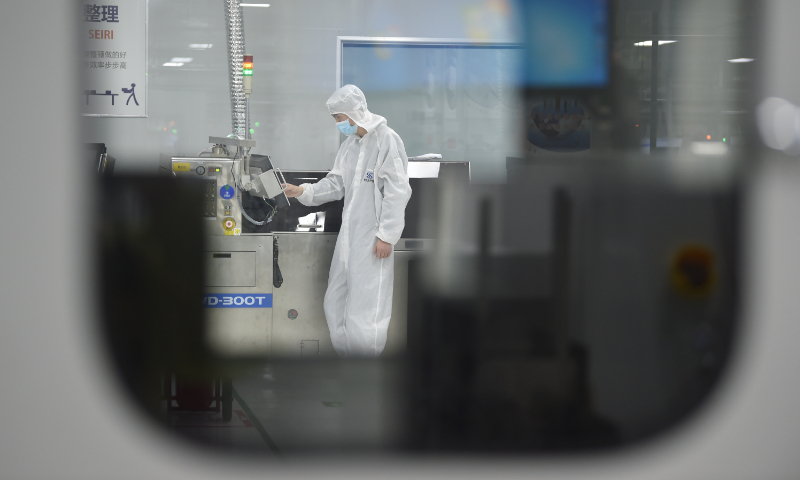
A worker produces chip at a workshop in Suqian, East China's Jiangsu Province, on February 28, 2023. Photo: VCG
The mounting US chip crackdown on China and Chinese firms starts to backfire, as major US chip companies have reportedly urged the Biden administration to refrain from further restrictions on chip exports to China in order to protect their profits in the world's largest commercial market for chips.
Chinese experts said that US' containment and suppression will threaten the survival of its own companies, destabilize global industrial and supply chains and ultimately hurt its own international competiveness.
These moves will only strengthen China's resolve and ability to pursue self-reliance and technological innovation, they said.
Executives of leading US chipmakers, including Intel, Qualcomm and Nvidia, met Biden administration officials on Monday, urging a halt to more chip export restrictions targeting China, Reuters reported, citing people familiar with the matter.
The Biden administration is considering another round of restrictions on chip exports to China, including cutting-edge artificial intelligence (AI) chips, according to the report.
"We urge the [Biden] administration to refrain from further restrictions until it engages more extensively with industry and experts to assess the impact of current and potential restrictions," the US-based Semiconductor Industry Association (SIA) said on Monday.
The SIA hopes for continued access to the world's largest commercial market for commodity semiconductors in China. The group said that the US government's move to impose "overly broad, ambiguous, and at times unilateral restrictions" risks diminishing the US semiconductor industry's competitiveness, disrupting supply chains, causing significant market uncertainty and prompting continued escalatory retaliation by China.
The three US firms and the SIA didn't comment when reached by the Global Times on Tuesday.
"Some US chip producers have made AI chips especially for China, showing that they can't afford to lose the massive market," Ma Jihua, founder of Beijing DARUI Management Consulting Co, told the Global Times on Tuesday.
According to the SIA, China remained to be the largest single market for semiconductors in 2022, with sales of $180.4 billion, about one-third of the global total.
China's chip sector has made breakthroughs in key sectors over the past five years, with domestic replacement levels greatly improved. This also prompted US chip firms' lobbying, as they are worried that China will achieve 100 percent domestic replacement, Ma said, and some US firms' survival is under threat.
"Although chips are key to the whole high-tech sector, the actual share isn't large. If the US continues to crack down, terminal manufacturers ranging from smartphones to electric vehicles may organize new industrial chains excluding the US, since China is still the global manufacturing hub," Ma said.
Zhou Bing, a vice president of Intel, said on Monday that the company will continue to expand in China, betting on the country's economy and the long-term development of the digital economy and chip industries, according to media reports.
The divergence between US political and business communities shows that many irrational US politicians have indulged in political correctness and see China as a strategic rival, Li Yong, a deputy chair of the expert committee of the China Association of International Trade, told the Global Times.
Li said that the US will extend its unreasonable crackdown on China and Chinese firms, which will seriously undermine the regained atmosphere of communication.
As positive signs of easing emerge in China-US relations, there have been increasingly bilateral exchanges in recent weeks.
Following visits by US Secretary State Antony Blinken and US Treasury Secretary Janet Yellen, US Special Presidential Envoy for Climate John Kerry arrived in Beijing on Sunday for a four-day visit to China.
However, US President Joe Biden said in an interview with CNN on July 9 that China has "enormous potential and enormous problems" and it wants to surpass the US, but bilateral relations can reach a "stable point."
The Biden administration is examining potential controls on outbound investment in China, which may be narrowly focused on cutting-edge technology, Bloomberg reported.
China opposes the US move of politicizing and weaponizing trade and technology. Creating barriers to normal tech and trade exchanges goes against market economy principles and disrupts global industrial and supply chain stability, which benefits no one, Foreign Ministry spokesperson Mao Ning said on Tuesday.
"We hope the US side could earnestly fulfill US President Joe Biden's commitment of no 'decoupling' from China, not stifling China's economic development and no containment on China, and build a sound environment for China-US economic cooperation," Mao said.
The US strategy of "decoupling" from and containing China is established, however, and it won't promote comprehensive cooperation, Zhao Gancheng, a research fellow from the Shanghai Institute for International Studies, told the Global Times.
"Only one or two exchanges will not make Washington revise its strategy toward China. The US will continue its high-tech blockade and crackdown on China to maintain supremacy while carrying out negotiations with China on issues conducive to the US or both sides," Zhao said.




